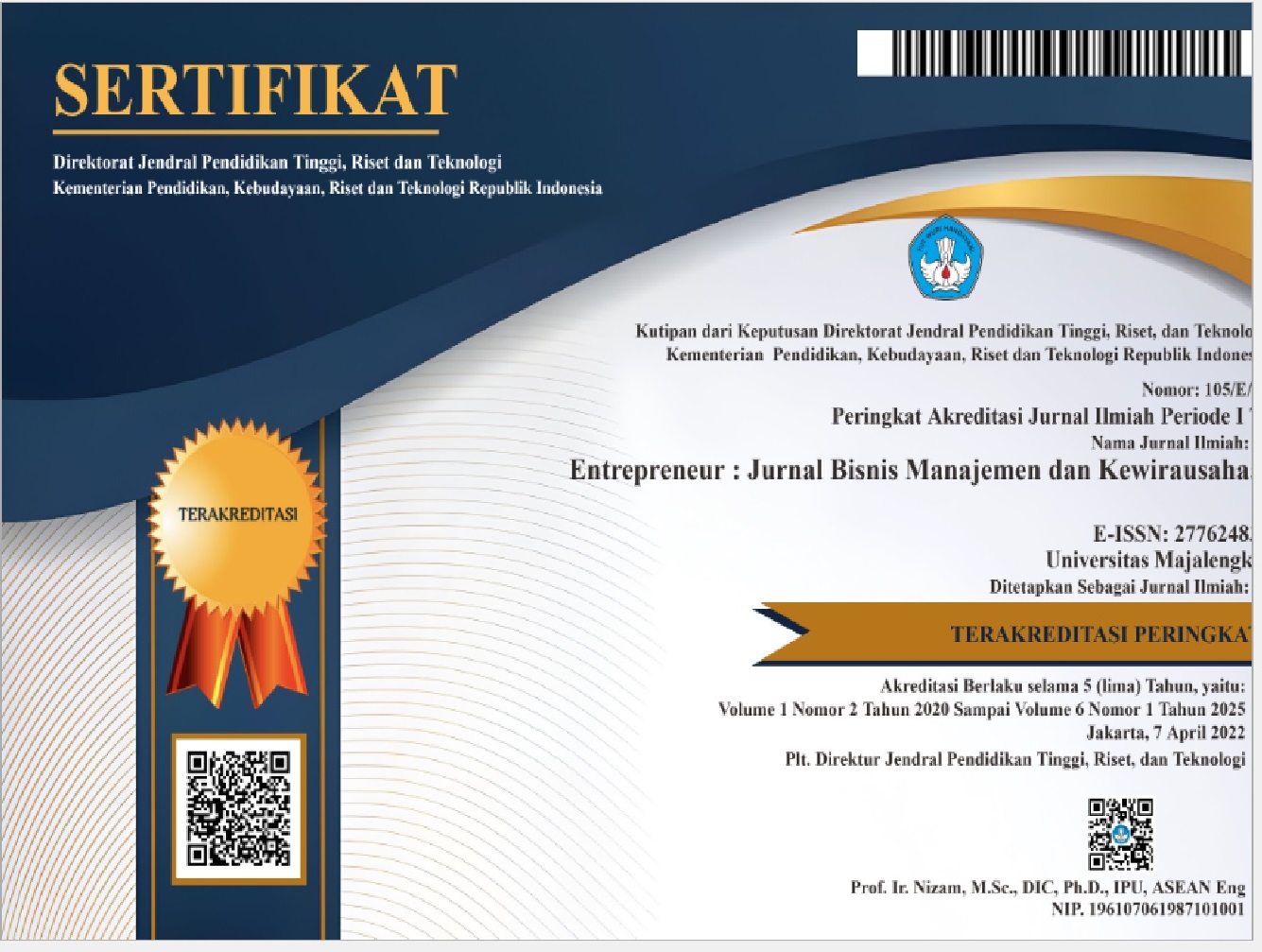Budaya Kerja Dan Kualitas Kerja Di PT. Bank Maluku Malut Cabang Tobelo
DOI:
https://doi.org/10.31949/entrepreneur.v6i1.13129Abstract
This research aims to determine work culture and the impact of work culture towards employee’s work quality at PT Bank Maluku Malut, Tobelo branch. This research uses descriptive qualitative methods. Data was obtained through interviews with 5 (five) research informants. The research results are then researched, analyzed, developed and adapted to supporting theories. The research results show that work culture as a reference, values, work design, work systems and organizational environment are things that need to be considered in efforts to achieve optimal employee work quality. Because, optimal employee work quality will have an impact on increasingly optimal organizational performance. The impact of work culture on work quality can be seen from 2 (two) sides, namely First, from the positive side, namely that it can improve the quality of employee work. Second, from the negative side, namely the occurrence of fraud or banking crime. Banking crimes can occur if employees misuse their skills at work for things that can harm themselves and the company. The role of organizational leaders is needed to encourage employee behavior in increasing work morale, working more structured, minimizing boredom at work and increasing work discipline.
Keywords:
Work Culture;Work Quality;Employee;Impact.Downloads
References
DAFTAR PUSTAKA
Adha, R. N., Nurul, Q., & Hafidzi, A. H. (2019). Pengaruh motivasi kerja, lingkungan kerja, budaya kerja terhadap kinerja karyawan dinas sosial kabupaten Jember. Jurnal Penelitian IPTEKS, 4(1), 47–62.
Anshori, A., Zakariya, F., Harjadi, D., & Djuniardi, D. (2023). Al Anshori, F. Z., Harjadi, D., & Djuniardi, D. (2023). Pengaruh Motivasi, Kompetensi Dan Budaya Kerja Terhadap Kinerja Guru Madrasah Ibtidaiyah Dengan Kepemimpinan Sebagai Variabel Moderating. Entrepreneur: Jurnal Bisnis Manajemen Dan Kewirausahaan, 4(3), 27–37.
Assa, A. F. (2022). Dampak kecerdasan emosional, inovasi dan budaya kerja dalam meningkatkan kinerja karyawan di Startup E-Commerce XYZ. Jurnal Ilmiah Manajemen, Ekonomi, & Akuntansi (MEA), 6(3), 1433–1449.
Darodjat, T. A. (2015). Pentingnya Budaya Kerja Tinggi dan Kuat Absolut. PT Refika Aditama.
Dilly, A., & Papuling, G. (2021). Analisis Dampak Mismatch Kualifikasi Pendidikan Dan Pekerjaan Pada Kualitas Kerja Karyawan di Halmahera Utara. Jurnal Manajemen, 6(2).
Djunaid, A. A. A., & Satrio, D. (2024). Pengaruh Kepemimpinan Transformasional, Budaya Organisasi, Komitmen Pegawai Terhadap Kinerja Pegawai (ASN Pemerintah Kota Pekalongan). Entrepreneur: Jurnal Bisnis Manajemen Dan Kewirausahaan, 5(2), 1–16.
Elvina. (2017). Pengaruh Budaya Kerja, Kualitas Kerja Dan Lingkungan Kerja Terhadap Kinerja Pegawai Pada Kantor Camat Kecamatan Aek Natas. Wahana Inovasi, 6(1).
Febrina, W., Widyastuti, T., & Primadhita, Y. (2022). Lingkungan, Budaya, dan Motivasi Kerja sebagai Faktor yang Mempengaruhi Kinerja Karyawan Universitas Mercu Buana. Jurnal Pengembangan Wiraswasta, 24(1).
Gusti, D. H. (2022). Pengaruh Budaya Kerja dan Disiplin Kerja terhadap Produktivitas Kerja. Jurnal Mirai Management, 7(3), 549–564.
Hasibuan, M. (2005). Manajemen Dasar, Pengertian dan Masalah. PT. Bumi Aksara.
Ikhsan, A. (2016). Analisis Pengaruh Budaya Organisasi dan Kepuasan Kerja terhadap Kinerja Karyawan Non Dosen pada Universitas Mercu Buana Jakarta. Jurnal Ilmiah Manajemen Dan Bisnis, 2(1), 17–35.
Irvan, M. (2021). Pengaruh Budaya Organisasi Dan Kualitas.Kerja Terhadap Kinerja Karyawan PT. Harkat Abadi. Universitas Islam Kalimantan MAB.
Lupiyoadi, R., & Hamdani, A. (2013). Manajemen pemasaran jasa. Salemba Empat.
Nahdluddin, M., & Maftukhah, I. (2015). Pengaruh Motivasi Kerja, Budaya Organisasi dan Kualitas Kehidupan Kerja terhadap Kinerja Karyawan. Management Analysis Journal, 4(3).
Nawawi, H. (2001). Manajemen sumber daya manusia (Edisi keli). Gadjah Mada University.
Ndraha, T. (2003). Budaya organisasi. Rineka Cipta.
Papuling, O. A. P., & Sugiarto, A. (2021). Membangun Manajemen Keberagaman Melalui Akulturasi Budaya Kerja Karyawan Ekspatriat dan Karyawan Lokal di PT NHM. Jurnal Ilmu Sosial Dan Humaniora, 10(3), 543–562.
Ramadhan, H. (2017). Penerapan Budaya Kerja Perseroan Terbatas Pelabuhan Indonesia IV (PERSERO) Kota Makasar.
Rao, T. . (2013). Penilaian Kinerja; Teori dan Praktek. PT. Pustaka Binaman Pressindo.
Robbins, S. P. (1998). Organizational behavior: concepts, controversies, applications. Prentice Hall.
Satato, Y. R., Adilase, B. P., & Subrata, G. (2022). Kompetensi, disiplin kerja dan budaya kerja pengaruhnya terhadap kinerja pegawai. Jurnal Ekonomi, Manajemen Pariwisata Dan Perhotelan, 1(1), 1–7.
Sugiyono, P. D. (2013). Metode Penelitian Kuantitatif, Kualitatif dan R&D. Penerbit Alfabeta.
Sukartini, S., & Gaol, P. L. (2022). Pengaruh Budaya Kerja Terhadap Kinerja Pegawai Pada Kelurahan Pejagalan Kota Administrasi Jakarta Utara. Jurnal Sumber Daya Aparatur, 4(2).
Supriono, G. (2022). Menuju Indonesia Emas Melalui Budaya Organisasi dan Budaya Kerja. CV. Bintang Semesta Media.
Triguno, D. (2004). Budaya KerjaMenciptakan Lingkungan Yang Kondusive untuk Meningkatkan Produktivitas Kerja. Golden Trayon Press.
Website: https://www.bankmalukumalut.co.id/). (n.d.). No Title. Website: Https://Www.Bankmalukumalut.Co.Id/).
Wibowo, A. (2021). Manajemen Perubahan (Change Management). Yayasan Prima Agus Teknik.
Widodo, D. (2017). Pengaruh Budaya Organisasi, Kepemimpinan dan Kompensasi melalui Motivasi Kerja terhadap Kinerja Pegawai. Jurnal Manajemen Motivasi, 13(2), 896–908.
Widodo, D. (2020). Membangun budaya kerja pada instansi pemerintah. Cipta Media Nusantara.
Published
How to Cite
Issue
Section
License
Copyright (c) 2025 Vebrianti Bitikal, Anita Dilly, Oktadwilaras Anugerah Putri Papuling

This work is licensed under a Creative Commons Attribution-ShareAlike 4.0 International License.
COPYRIGHT NOTICE
An author who publishes in the Entrepreneur: Jurnal Bisnis Manajemen dan Kewirausahaan agrees to the following terms:
1. Author retains the copyright and grants the journal the right of first publication of the work simultaneously licensed under the Creative Commons Attribution-ShareAlike 4.0 License that allows others to share the work with an acknowledgment of the work's authorship and initial publication in this journal
2. The author is able to enter into separate, additional contractual arrangements for the non-exclusive distribution of the journal's published version of the work (e.g., post it to an institutional repository or publish it in a book) with the acknowledgment of its initial publication in this journal.
3. The author is permitted and encouraged to post his/her work online (e.g., in institutional repositories or on their website) prior to and during the submission process, as it can lead to productive exchanges, as well as earlier and greater citation of the published work








